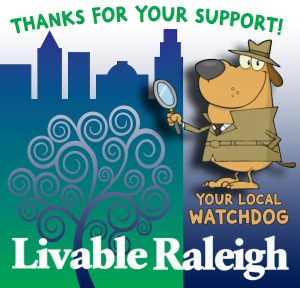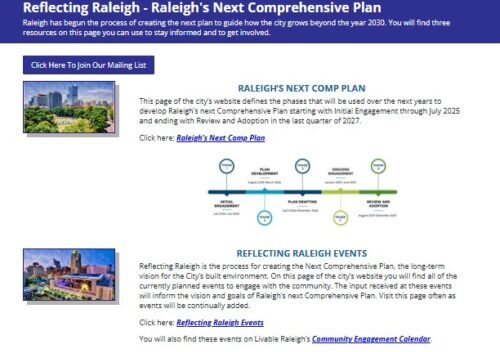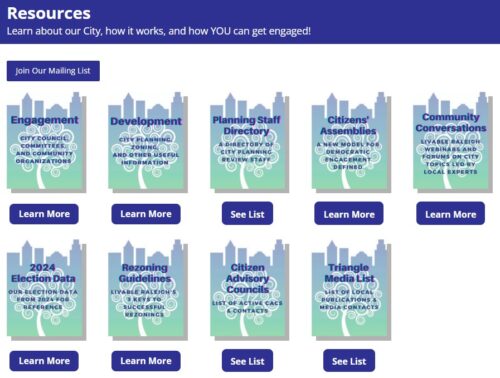CITIZENS’ ASSEMBLIES
A New Model for Democratic Engagement
We recently published information about Citizens’ Assemblies and how Raleigh plans to use them as an engagement technique in developing the city’s next Comprehensive Plan as we come to the end of the planned life of the current 2030 Comprehensive Plan.
You can find the information on our website here:
A Citizens’ Assembly will be used as part of the process to create Raleigh’s next Comp Plan. You can see the whole process here:
Reflecting Raleigh – Raleigh’s Next Comprehensive Plan
Our “Resources” page contains a link to the document which describes “Citizens’ Assemblies” along with many other valuable resources.
Find it here: Resources
Introduction
In an age of growing political polarization and public distrust in traditional institutions, Citizens’ Assemblies offer an alternative for democratic engagement. These assemblies convene ordinary citizens, selected to represent a demographic cross-section of a population, to deliberate on complex policy issues and propose recommendations to decision-makers.
What Is a Citizens’ Assembly?
A Citizens’ Assembly is a body of individuals randomly selected to mirror the broader population in terms of age, gender, ethnicity, and socioeconomic background. Over several sessions, participants are informed by experts*, deliberate among themselves, and work toward consensus on specific issues. Topics may range from climate policy to electoral reform.
Why Are They Valuable?
Unlike traditional town halls or public consultations, which often attract a self-selecting group of vocal participants, Citizens’ Assemblies provide a structured space for inclusive, representative, and informed discussion. They offer:
- Deeper public engagement in policy-making.
- Balanced deliberation free from party politics.
- Legitimacy and trust in recommendations grounded in collective reasoning.
Real-World Impact
Public engagement in previous City planning efforts relied heavily on workshops and online surveys, methods which tend to underrepresent marginalized voices. In contrast, Citizen Assemblies aim to amplify a broader spectrum of opinions, making civic processes more equitable and robust.
Why Is This Important to Raleigh?
Raleigh is planning to utilize a Citizen Assembly as the final two-year stage for Reflecting Raleigh – the next Comprehensive Plan. (more here: Next Comp Plan)
-
- Citizens’ Assemblies are typically more limited and usually applicable to cities with a population of less than 50,000 people. This will be the first application of this approach in North Carolina and the first documented use of a Citizen Assembly for a city with a large population of nearly half a million residents.
- Based on reference uses of Citizens’ Assemblies, it will also be in place for a much longer period of time with a budgeted cost considerably lower than comparative national examples.
- Raleigh has budgeted less than $200,000, whereas most other models can cost from
$250,000 to several million dollars for projects of much shorter duration. - In the US, the best-known example is in Petaluma, California. A Citizen Assembly was used to determine how to redevelop a 55-acre fairground, over a span of 36 hours, for a cost of $425,000.
Challenges and Considerations
Despite their potential, Citizens’ Assemblies are not without challenges:
-
- They require resources: time, funding, and skilled facilitation.
- Political bodies must be willing to act on the recommendations for the process to be meaningful.
- Maintaining transparency and public trust is crucial.
Conclusion
Citizens’ Assemblies are not a silver bullet, but they are a powerful supplement to representative democracy. By fostering informed, inclusive debate, they help bridge the gap between the public and policymakers—and reinvigorate democratic governance for the 21st century.
Download this document here: What are Citizens’ Assemblies
* Final Note – “participants are informed by experts” may be a very good thing as long as it means being informed by experts from all sides of an issue. If not, the process could turn into nothing more than guiding the participants to a predetermined outcome preferred by city staff and simply provide the appearance of engagement.
Livable Raleigh Editorial Team
If you appreciate the kind of reporting we bring to you
|
Please donate $10 or $20, Thanks for supporting |
 |



